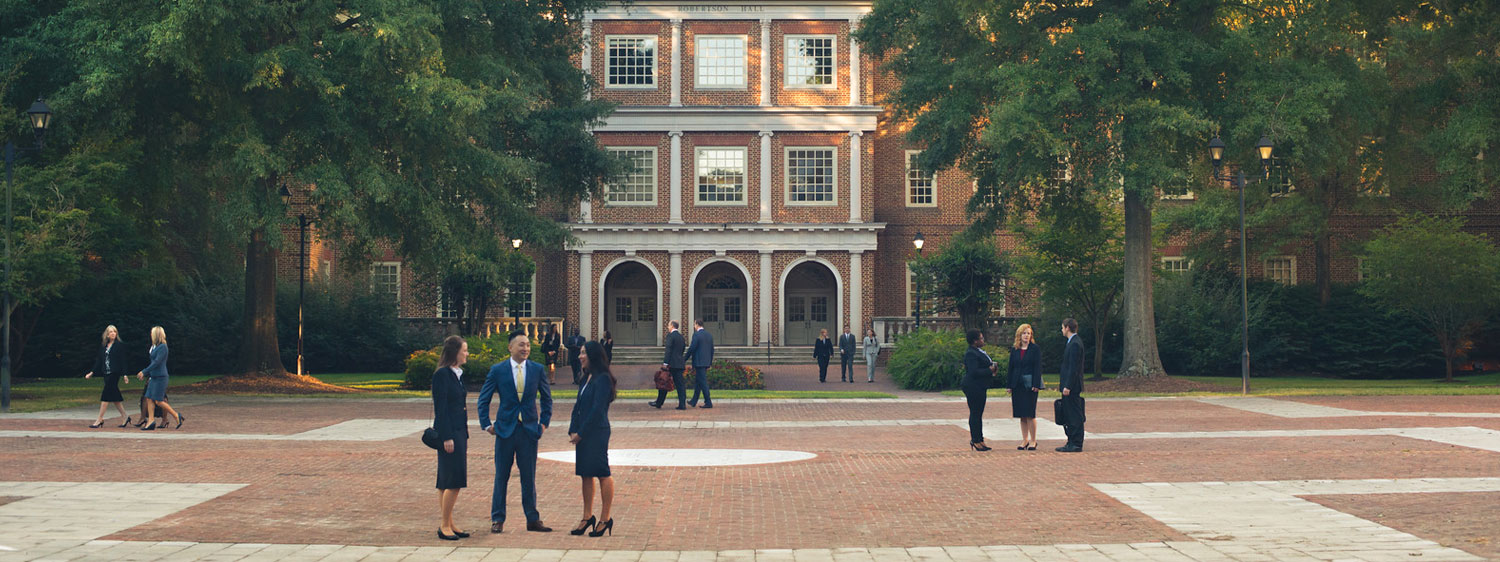
Philosophy & Mission
Practice Ready, Purpose Driven
“He has shown you, O mortal, what is good. And what does the LORD require of you? To act justly and to love mercy and to walk humbly with your God.” Micah 6:8 (NIV)
At Regent University School of Law, academic excellence, coupled with an emphasis on spiritual integrity, educates a different kind of lawyer, uniquely prepared to practice law. Here you can be trained not only to practice law, but you can also be well-equipped to enter the legal profession as a fully integrated lawyer with a thorough knowledge of the law, the practice skills to put that knowledge to use, and the character necessary to succeed with integrity.
Our commitment to faith-law integration is woven into our curriculum, as our faculty, dedicated to Christ’s call both personally and professionally, provide a caring and nurturing environment in which students gain an understanding of the foundations of law and learn to develop the ethical and moral code required for the recognition and resolution of ethical dilemmas. Additionally, students are encouraged to explore the call of God on their lives, the gifts God has given them, and discover how this translates into the practice of law.
Law is both practical and theoretical. At Regent Law, we emphasize both. We give great weight to the practical, experiential side of legal education. Students at Regent Law are trained to be not only purpose driven but also practice ready. In addition to mentorship and internship opportunities, Regent students can receive hands-on experience at Regent’s Legal Aid Clinic, Robertson Center for Constitutional Law, Center for Ethical Formation, and Center for Global Justice. Our classroom instruction, coupled with various scholastic practica, aims to give graduates the essential skill sets necessary to practice law in its many, disparate specialties.
That said, we also educate students on the theoretical aspects of our legal canon. American law was rooted in the classical liberalism of the Western intellectual tradition and carried to our shores in the form of English common-law traditions with natural-law antecedents. American constitutionalism synthesized these First Principles in a virtuous effort “to form a more perfect Union” committed to justice, tranquility, and the “Blessings of Liberty.” It is essential, we believe (as did Martin Luther King Jr.) that modern jurisprudential debates take into account the sages of the past (St. Augustine and St. Thomas Aquinas, for example, referenced in King’s Letter from Birmingham Jail) as well as the views of modern intellectuals. In short, we take history seriously. Both the present and the future depend on it.
It is through our rigorous legal education in the context of a supportive Christian community that our students are equipped to be practice-ready, purpose-driven graduates with the confidence and spiritual integrity to seek justice, love mercy, and walk humbly with God as Christian leaders who will change the world.
Regent University serves as a center of Christian thought and action to provide excellent education through a biblical perspective and global context, equipping Christian leaders to change the world. These values permeate the law school. Our mission is to provide an excellent legal education from a Christian perspective, to nurture and encourage our students toward spiritual maturity, and to engage the world through Christian legal thought and practice.
The law school mission includes:
- Education and training of students to become excellent lawyers.
- Nurturing and encouragement of students to become mature Christians who are empowered with the Holy Spirit and display the fruits of the Holy Spirit in their personal and professional lives while impacting the world.
- The grounding of students in the biblical foundations of law, legal institutions, and processes of conflict resolution; the recognition of questions of righteousness in the operation of law; and the pursuit of true justice through professional legal service.
- Community of other law students, practicing lawyers, judges, legislators, government officials, educators, and others to recognize and seek the biblical foundations of law, legal institutions, and the processes of conflict resolution; to recognize questions of righteousness in the operation of the law; and to pursue true justice through professional legal service.
- Christ-Centered Community: Perhaps you’ve heard that law students report high levels of anxiety, loneliness, and division. We’re different. Our professors and students support, encourage, and pray for each other. As a Christian community, we hope that the fruit of the Spirit—love, joy, peace, patience, kindness, goodness, faithfulness, gentleness, and self-control—are abundant here.
- Truth: Law is not a game or merely a competition among advocates. It is a search for truth in pursuit of justice. We believe truth and justice are real, and we are not afraid to pursue them.
- Servant Leadership: The rest of the world might tell you lawyers are sharks, and law practice is a means to status and power. At Regent, we teach that lawyers can be healers. We believe that the lawyer’s greatest privilege is to walk with a client as they face a daunting challenge or serve them as they achieve a lifelong dream.
- Discipleship: We seek to know and care for our students the way the Bible teaches that God knows and cares for us. We believe each student has a unique call on their life. We’re committed to helping you discern and step into that calling. Our professors will do more than deliver lectures. They will mentor you and model what it looks like to do justly, love mercy, and walk humbly. Our high bar passage rates and strong employment outcomes prove it’s working.
- Advocacy: Regent Law seeks to train, inspire, and launch advocates into positions of service and influence around the world. Our Center for Constitutional Law trains advocates to protect free speech and religious liberty. Our Center for Global Justice prepares lawyers to advocate for those who are wrongfully imprisoned or victims of human trafficking. Our pro bono clinic works with people who cannot afford a lawyer to ensure they have an advocate who can seek justice.
